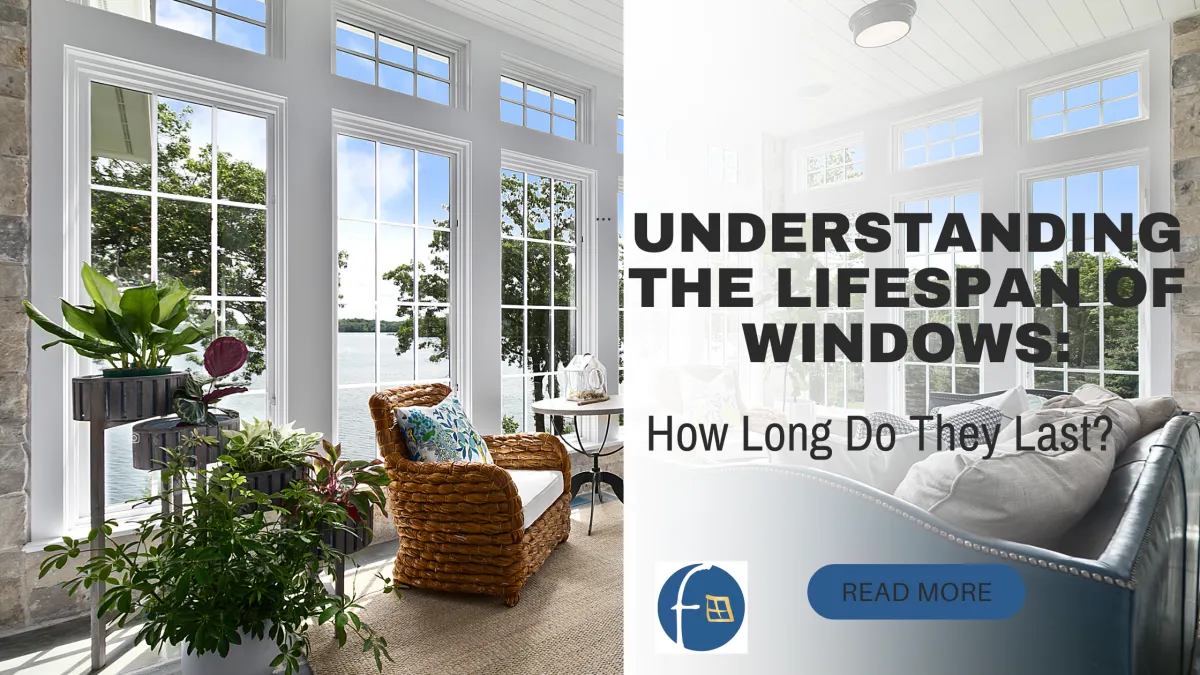Fasada Tips & Tricks

Understanding the Lifespan of Windows: How Long Do They Last?
If a baseball suddenly smashes through your window, courtesy of neighborhood antics, a swift replacement is in order. But what about the natural lifespan of a window, untouched by such mishaps? How do environmental factors and regular wear and tear influence their longevity? And what can you do to ensure your windows endure the test of time? Whether you're a seasoned homeowner or new to the game, grasping the lifespan of your windows and adopting practices to extend it can significantly impact your homeownership experience. Here, our team at Fasada Windows and Doors delves into the details of window longevity and when it might be time to contemplate your next window upgrade.
What's the Typical Lifespan of Windows?
On average, window glass can last around 20 years, while the window frame may endure up to 50 years, contingent upon factors such as material, upkeep, and climatic conditions. While exceptions exist, these estimates serve as reliable guidelines. Throughout this period, you might encounter instances requiring the replacement of specific window parts, but a complete overhaul is often unnecessary—especially if your warranty covers these components. Speaking of warranties, it's wise to scrutinize the warranty duration upon purchase; a warranty shorter than a decade could signal a less reputable company, as a reliable window manufacturer typically stands by the longevity of their product.

How Long Do Different Types of Windows Last?
Vinyl Windows: With an average lifespan of 20 to 40 years, vinyl windows offer durability and low maintenance. However, they're susceptible to heat-induced warping, especially if painted post-installation. Consulting your contractor about sun exposure and protective measures is advisable, particularly in warmer climates.
Aluminum Windows: These windows boast a lifespan of 40 to 50 years, thanks to their rust resistance and durability against various weather conditions. However, their energy efficiency might not be ideal for colder climates.
Wood Windows: Typically lasting around 20 years, wood windows can endure for generations with proper care and installation. However, they're prone to rot and deterioration, particularly in moist environments. Regular inspection for signs of damage like warping or rot is crucial to mitigate potential issues.

When Is It Time for Window Replacement?
Recognizing the signs indicating a window replacement is essential for maintaining a comfortable and structurally sound home environment:
Visible Damage: Cracks, moisture buildup, or mold are clear indicators that replacement is necessary. Addressing visible damage promptly can prevent more extensive structural issues down the line.
Malfunctions: Difficulty in opening, closing, or locking windows can lead to drafts, compromising energy efficiency and security.
Fluctuating Bills: Rising energy bills, especially if disproportionate to economic trends, might indicate window-related energy inefficiency. Simple tests like the candle test can help detect drafts and identify areas needing attention.
Noise Bleed: If external noise disrupts your home's tranquility, investing in soundproofing measures like triple-paned glass can significantly reduce noise infiltration.

How Long Do Replacement Windows Last?
Replacement windows can last as long as their original counterparts, provided there are no unresolved issues or new damages. Regular maintenance and vigilance against environmental hazards can prolong their lifespan. Repainting, cleaning, and inspecting windows regularly are simple yet effective measures to ensure their longevity.
Tips for Extending Window Lifespan
Regular cleaning of windows and frames.
Keeping window tracks clear of dust and debris.
Prompt re-caulking of windows to prevent leaks.
Regular inspection for signs of damage like mold or rot.
Replacement of worn seals and weather stripping.
Repainting every 3-5 years to protect frames from the elements.
Avoiding water damage by directing sprinklers away from windows and cleaning gutters regularly.
Ready for a Window Replacement?
If your windows are showing signs of wear and tear or you're considering an upgrade, don't hesitate to seek professional assistance. Fasada Windows and Doors exterior design consultants are equipped to guide you through the process, from selection to installation. Schedule a risk-free in-home estimate today and embark on your journey towards enhanced comfort and efficiency with quality windows tailored to your needs.
All About Doors

Understanding the Lifespan of Windows: How Long Do They Last?
If a baseball suddenly smashes through your window, courtesy of neighborhood antics, a swift replacement is in order. But what about the natural lifespan of a window, untouched by such mishaps? How do environmental factors and regular wear and tear influence their longevity? And what can you do to ensure your windows endure the test of time? Whether you're a seasoned homeowner or new to the game, grasping the lifespan of your windows and adopting practices to extend it can significantly impact your homeownership experience. Here, our team at Fasada Windows and Doors delves into the details of window longevity and when it might be time to contemplate your next window upgrade.
What's the Typical Lifespan of Windows?
On average, window glass can last around 20 years, while the window frame may endure up to 50 years, contingent upon factors such as material, upkeep, and climatic conditions. While exceptions exist, these estimates serve as reliable guidelines. Throughout this period, you might encounter instances requiring the replacement of specific window parts, but a complete overhaul is often unnecessary—especially if your warranty covers these components. Speaking of warranties, it's wise to scrutinize the warranty duration upon purchase; a warranty shorter than a decade could signal a less reputable company, as a reliable window manufacturer typically stands by the longevity of their product.

How Long Do Different Types of Windows Last?
Vinyl Windows: With an average lifespan of 20 to 40 years, vinyl windows offer durability and low maintenance. However, they're susceptible to heat-induced warping, especially if painted post-installation. Consulting your contractor about sun exposure and protective measures is advisable, particularly in warmer climates.
Aluminum Windows: These windows boast a lifespan of 40 to 50 years, thanks to their rust resistance and durability against various weather conditions. However, their energy efficiency might not be ideal for colder climates.
Wood Windows: Typically lasting around 20 years, wood windows can endure for generations with proper care and installation. However, they're prone to rot and deterioration, particularly in moist environments. Regular inspection for signs of damage like warping or rot is crucial to mitigate potential issues.

When Is It Time for Window Replacement?
Recognizing the signs indicating a window replacement is essential for maintaining a comfortable and structurally sound home environment:
Visible Damage: Cracks, moisture buildup, or mold are clear indicators that replacement is necessary. Addressing visible damage promptly can prevent more extensive structural issues down the line.
Malfunctions: Difficulty in opening, closing, or locking windows can lead to drafts, compromising energy efficiency and security.
Fluctuating Bills: Rising energy bills, especially if disproportionate to economic trends, might indicate window-related energy inefficiency. Simple tests like the candle test can help detect drafts and identify areas needing attention.
Noise Bleed: If external noise disrupts your home's tranquility, investing in soundproofing measures like triple-paned glass can significantly reduce noise infiltration.

How Long Do Replacement Windows Last?
Replacement windows can last as long as their original counterparts, provided there are no unresolved issues or new damages. Regular maintenance and vigilance against environmental hazards can prolong their lifespan. Repainting, cleaning, and inspecting windows regularly are simple yet effective measures to ensure their longevity.
Tips for Extending Window Lifespan
Regular cleaning of windows and frames.
Keeping window tracks clear of dust and debris.
Prompt re-caulking of windows to prevent leaks.
Regular inspection for signs of damage like mold or rot.
Replacement of worn seals and weather stripping.
Repainting every 3-5 years to protect frames from the elements.
Avoiding water damage by directing sprinklers away from windows and cleaning gutters regularly.
Ready for a Window Replacement?
If your windows are showing signs of wear and tear or you're considering an upgrade, don't hesitate to seek professional assistance. Fasada Windows and Doors exterior design consultants are equipped to guide you through the process, from selection to installation. Schedule a risk-free in-home estimate today and embark on your journey towards enhanced comfort and efficiency with quality windows tailored to your needs.
All About Windows

Understanding the Lifespan of Windows: How Long Do They Last?
If a baseball suddenly smashes through your window, courtesy of neighborhood antics, a swift replacement is in order. But what about the natural lifespan of a window, untouched by such mishaps? How do environmental factors and regular wear and tear influence their longevity? And what can you do to ensure your windows endure the test of time? Whether you're a seasoned homeowner or new to the game, grasping the lifespan of your windows and adopting practices to extend it can significantly impact your homeownership experience. Here, our team at Fasada Windows and Doors delves into the details of window longevity and when it might be time to contemplate your next window upgrade.
What's the Typical Lifespan of Windows?
On average, window glass can last around 20 years, while the window frame may endure up to 50 years, contingent upon factors such as material, upkeep, and climatic conditions. While exceptions exist, these estimates serve as reliable guidelines. Throughout this period, you might encounter instances requiring the replacement of specific window parts, but a complete overhaul is often unnecessary—especially if your warranty covers these components. Speaking of warranties, it's wise to scrutinize the warranty duration upon purchase; a warranty shorter than a decade could signal a less reputable company, as a reliable window manufacturer typically stands by the longevity of their product.

How Long Do Different Types of Windows Last?
Vinyl Windows: With an average lifespan of 20 to 40 years, vinyl windows offer durability and low maintenance. However, they're susceptible to heat-induced warping, especially if painted post-installation. Consulting your contractor about sun exposure and protective measures is advisable, particularly in warmer climates.
Aluminum Windows: These windows boast a lifespan of 40 to 50 years, thanks to their rust resistance and durability against various weather conditions. However, their energy efficiency might not be ideal for colder climates.
Wood Windows: Typically lasting around 20 years, wood windows can endure for generations with proper care and installation. However, they're prone to rot and deterioration, particularly in moist environments. Regular inspection for signs of damage like warping or rot is crucial to mitigate potential issues.

When Is It Time for Window Replacement?
Recognizing the signs indicating a window replacement is essential for maintaining a comfortable and structurally sound home environment:
Visible Damage: Cracks, moisture buildup, or mold are clear indicators that replacement is necessary. Addressing visible damage promptly can prevent more extensive structural issues down the line.
Malfunctions: Difficulty in opening, closing, or locking windows can lead to drafts, compromising energy efficiency and security.
Fluctuating Bills: Rising energy bills, especially if disproportionate to economic trends, might indicate window-related energy inefficiency. Simple tests like the candle test can help detect drafts and identify areas needing attention.
Noise Bleed: If external noise disrupts your home's tranquility, investing in soundproofing measures like triple-paned glass can significantly reduce noise infiltration.

How Long Do Replacement Windows Last?
Replacement windows can last as long as their original counterparts, provided there are no unresolved issues or new damages. Regular maintenance and vigilance against environmental hazards can prolong their lifespan. Repainting, cleaning, and inspecting windows regularly are simple yet effective measures to ensure their longevity.
Tips for Extending Window Lifespan
Regular cleaning of windows and frames.
Keeping window tracks clear of dust and debris.
Prompt re-caulking of windows to prevent leaks.
Regular inspection for signs of damage like mold or rot.
Replacement of worn seals and weather stripping.
Repainting every 3-5 years to protect frames from the elements.
Avoiding water damage by directing sprinklers away from windows and cleaning gutters regularly.
Ready for a Window Replacement?
If your windows are showing signs of wear and tear or you're considering an upgrade, don't hesitate to seek professional assistance. Fasada Windows and Doors exterior design consultants are equipped to guide you through the process, from selection to installation. Schedule a risk-free in-home estimate today and embark on your journey towards enhanced comfort and efficiency with quality windows tailored to your needs.

All About Shutters & Blinds

Understanding the Lifespan of Windows: How Long Do They Last?
If a baseball suddenly smashes through your window, courtesy of neighborhood antics, a swift replacement is in order. But what about the natural lifespan of a window, untouched by such mishaps? How do environmental factors and regular wear and tear influence their longevity? And what can you do to ensure your windows endure the test of time? Whether you're a seasoned homeowner or new to the game, grasping the lifespan of your windows and adopting practices to extend it can significantly impact your homeownership experience. Here, our team at Fasada Windows and Doors delves into the details of window longevity and when it might be time to contemplate your next window upgrade.
What's the Typical Lifespan of Windows?
On average, window glass can last around 20 years, while the window frame may endure up to 50 years, contingent upon factors such as material, upkeep, and climatic conditions. While exceptions exist, these estimates serve as reliable guidelines. Throughout this period, you might encounter instances requiring the replacement of specific window parts, but a complete overhaul is often unnecessary—especially if your warranty covers these components. Speaking of warranties, it's wise to scrutinize the warranty duration upon purchase; a warranty shorter than a decade could signal a less reputable company, as a reliable window manufacturer typically stands by the longevity of their product.

How Long Do Different Types of Windows Last?
Vinyl Windows: With an average lifespan of 20 to 40 years, vinyl windows offer durability and low maintenance. However, they're susceptible to heat-induced warping, especially if painted post-installation. Consulting your contractor about sun exposure and protective measures is advisable, particularly in warmer climates.
Aluminum Windows: These windows boast a lifespan of 40 to 50 years, thanks to their rust resistance and durability against various weather conditions. However, their energy efficiency might not be ideal for colder climates.
Wood Windows: Typically lasting around 20 years, wood windows can endure for generations with proper care and installation. However, they're prone to rot and deterioration, particularly in moist environments. Regular inspection for signs of damage like warping or rot is crucial to mitigate potential issues.

When Is It Time for Window Replacement?
Recognizing the signs indicating a window replacement is essential for maintaining a comfortable and structurally sound home environment:
Visible Damage: Cracks, moisture buildup, or mold are clear indicators that replacement is necessary. Addressing visible damage promptly can prevent more extensive structural issues down the line.
Malfunctions: Difficulty in opening, closing, or locking windows can lead to drafts, compromising energy efficiency and security.
Fluctuating Bills: Rising energy bills, especially if disproportionate to economic trends, might indicate window-related energy inefficiency. Simple tests like the candle test can help detect drafts and identify areas needing attention.
Noise Bleed: If external noise disrupts your home's tranquility, investing in soundproofing measures like triple-paned glass can significantly reduce noise infiltration.

How Long Do Replacement Windows Last?
Replacement windows can last as long as their original counterparts, provided there are no unresolved issues or new damages. Regular maintenance and vigilance against environmental hazards can prolong their lifespan. Repainting, cleaning, and inspecting windows regularly are simple yet effective measures to ensure their longevity.
Tips for Extending Window Lifespan
Regular cleaning of windows and frames.
Keeping window tracks clear of dust and debris.
Prompt re-caulking of windows to prevent leaks.
Regular inspection for signs of damage like mold or rot.
Replacement of worn seals and weather stripping.
Repainting every 3-5 years to protect frames from the elements.
Avoiding water damage by directing sprinklers away from windows and cleaning gutters regularly.
Ready for a Window Replacement?
If your windows are showing signs of wear and tear or you're considering an upgrade, don't hesitate to seek professional assistance. Fasada Windows and Doors exterior design consultants are equipped to guide you through the process, from selection to installation. Schedule a risk-free in-home estimate today and embark on your journey towards enhanced comfort and efficiency with quality windows tailored to your needs.

WINDOW AND DOOR PROBLEMS? WE HAVE THE SOLUTION.
With 25 years of expertise in The GTA, Fasada is your premier solution for window and door needs in Oakville. Bid farewell to issues like rot, drafts, and unreliable installations. Our high-quality products and expert installation guarantee a seamless experience. Whether upgrading your existing home or enhancing a new one, Fasada is the smart choice. Explore our Oakville showroom for attractive, functional, and secure windows and doors, complemented by cozy window coverings for every room.
Oakville l Burlington l Milton l Hamilton l Mississauga l And Surrounding Areas
Unit 4 – 2512 Old Bronte Rd. Oakville, ON L6M 4J3
Call Us Today: (905) 827-3331
Send us a Message info@fasada.ca
Copyright 2024. All rights reserved

